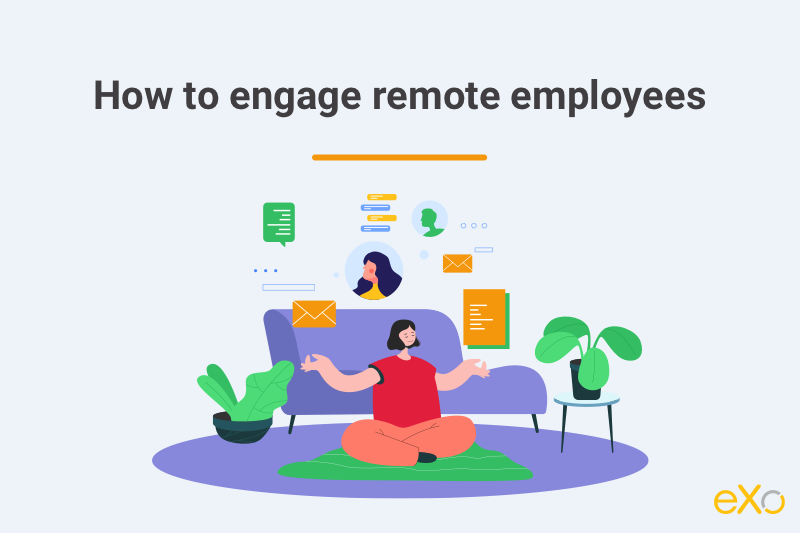- Fares Laroui
- April 29, 2020
How eXoers have been coping with social distancing
Staying home is arguably our best bet to overcoming the coronavirus and getting back to our normal lives. However, for businesses, the transition from office-based operations to remote working may have been a bit trickier. This is mainly due to the fact that employees are not used to this new way of work (or at least not to this extent) and a big portion of businesses will not have had policies in place as an anticipation of such a crisis. A joint effort from both the organization and its employees is thus required to facilitate the transition and to ensure business continuity during and beyond this difficult period. Many business owners and individuals have taken to Google, linkedin, Quora and other social media channels to look for the right answers, best practices and tools to collaborate effectively from home.

Content
A quick look at Google Trends, for example, shows the increasing number of searches related to remote work. The results include thousands if not millions of articles and blog posts with collaboration tips and best practices that can help and more importantly inspire a better remote work experience. However, it is worth noting that each company has its own unique story along with different tips when it comes to social distancing.
In this blog post, we discover how eXoers have been coping with social distancing so far, along with going over a few tips from our different teams.
Meetings, meetings and more meetings
Meetings are an important component of everyday office life. Their role is even more crucial when teams are spread across various locations and maybe different time zones. Whether the meetings are daily, like a daily scrum meeting for example, or weekly, as is the case for some teams, they can help align teams and keep them on the same page. For a meeting to be effective, it needs to be scheduled well in advance, have a clear agenda, actionable outcomes, accurate meeting notes and of course it needs the right tools for it to go ahead effectively (be it video conference software or a chat application).
« Keeping in touch with my team members on a regular basis helped us align our priorities and objectives. We have always favoured an informal approach during these meetings to encourage participants to share their opinion freely and to voice their concerns regarding their individual remote work experiences »

Define and share objectives with the team
Team culture is key to effectively facing and managing unprecedented crises, like the one we are living today. By team culture, we mean the shared values, attitudes and behaviours that define a team and how individuals can come together to achieve a common goal. The success of any team starts with the individual. Employees who know their roles and responsibilities and are willing to share and contribute constitute the backbone of a successful collaborative experience.
« I always start my workday with preparing my ‘to do’ list; which should be reasonable. Sharing my priorities with the team helps me to be more efficient »
Collaborate and come together using spaces
Creating a host of dedicated collaborative spaces can help facilitate communication and the exchange of information within and between teams. These spaces can be centred around teams, projects and/or communities of interest.
« Since we have teams spread across various locations, being able to join spaces for specific projects or other various purposes helped me get in touch with my peers, whether for work or non-work related fun activities, »

Manage time effectively
Time is definitely on our side during social distancing, but that doesn’t mean that managing it effectively is an easy feat. This is because, more often than not, remote teams have the added pressure to demonstrate their worth and prove that they can adapt to the current circumstances. Add to that the inexperience and the change in daily habits and the result can be disorganized processes and burned-out teams. This is why it is crucial to figure out a way to manage time and to find a good work–life balance.
« I’m working with Pomodoros techniques. It means working 25 minutes (that is one pomodoro), then you take a short break of 5 minutes to rest; you do that 4 times, then you take a long break of 25 minutes. »

Maintain and digitize our daily habits
« Before starting my remote work day, I take the time to get dressed first to feel like I am at the office and i prepare my playlist in advance because i think music is a great source of inspiration »

It goes without saying that life with social distancing is quite different to what it used to be. A normal workday prior to the confinement usually consisted of numerous meetings, spontaneous interactions with colleagues, coffee breaks and a bit of work of course. This doesn’t have to change though. Digitizing the workplace and maintaining our daily habits should be feasible with the multitude of telecommunication and collaborative tools we have at our disposal. Everything we do daily can be replicated to some extent through digital channels. Think of morning gatherings, quick chats with colleagues and other activities.
« It is a reflection on how to digitize your daily habits in order to maintain the good atmosphere as well as the good dynamics of the team, »
Keep in touch with the community
« We can’t deny how remote work is a survival strategy these days, but the absence of office camaraderie can wear down commitment and productivity. That’s why an internal community is the need of the hour. Such communities help capture and transfer knowledge, enhance employee engagement and satisfaction and help employees feel less lonely, »

Take the time to learn new things and develop skills
This period might be the perfect time to learn and develop new skills and to generally grow as a person. The attractive offers of popular e-learning platforms, like Udemy, Linkedin and Skillshare, make it easy to access all sorts of courses nowadays, from business and engineering to sports, music and other activities.
« I found keeping an active lifestyle even when working remotely to be really helpful. I take frequent breaks to do some aerobic exercises that help improve my energy levels and general mood every 2 to 3 hours. Additionally, I try my best to reserve some time each day for self-development. To me, learning new skills and challenging myself to become better each and every day has left me with a clearer mind and a better focus, »
Recognize exoers for their efforts
As mentioned earlier, working from home can take its toll on the mental state of employees. Luckily, small gestures by both managers and peers can make a difference though. A simple “thank you” message, a kudos, whether in the company intranet or on Linkedin for example, can make the day of an employee, since recognition has been reported in many studies to be associated with increased productivity and an engaged workforce.
« Recognized and valued colleagues contribute to the success of the company. I always make sure to praise my peers’ work by sending kudos within our platform or even simple encouraging messages, »

So there you have it – eXoers tips to cope with social distancing and to work effectively from home. Tell us more about your remote work experiences in the comment section and don’t forget to subscribe to our newsletter for more similar content. Stay home and keep safe everybody.
discover all the features and benefits
- Tags: eXo, Future of work, Remote work, Tips & Tricks
Related posts
- All
- eXo
- Digital workplace
- Employee engagement
- Open source
- Future of work
- Internal communication
- Collaboration
- News
- intranet
- workplace
- Knowledge management
- Employee experience
- Employee productivity
- onboarding
- Employee recognition
- Change management
- Cartoon
- Digital transformation
- Infographic
- Remote work
- Industry trends
- Product News
- Thought leadership
- Tips & Tricks
- Tutorial
- Uncategorized
Leave a Reply
( Your e-mail address will not be published)


